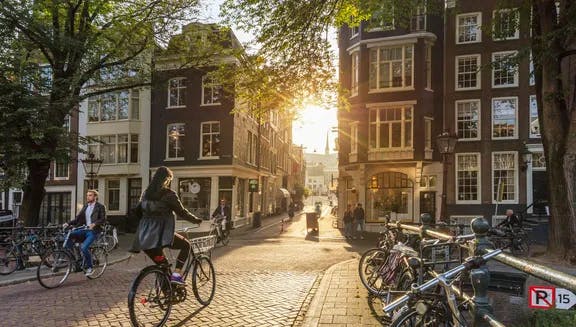
The Netherlands Commercial Court: settling international business disputes in English
A fully English-speaking court in Amsterdam
There’s something quite nerve-racking about making an appointment with a judge. Whether it’s the thought of the gavel’s slam on cratered wood or the (supposed) steely nature of someone who sits behind the bench, it’s hard not to think of these dispensers of justice as somewhat terrifying. So it was a welcome surprise that spending time in the company of Netherlands Commercial Court of Appeal President Duco Oranje was a true pleasure. We discussed everything from the finer points of international business disputes to the reasons he loves living and working in Amsterdam.
Oranje met with I amsterdam to talk about the Netherlands Commercial Court (NCC), Amsterdam’s English-speaking court to resolve businesses disputes. It is a boon for international companies often operating across many countries in different languages, and is one of the only European commercial courts to offer everything in English, including documentation, proceedings, pleadings and judgements.
Why international businesses feel at home in the Dutch capital
Setting up and establishing a business in the Amsterdam Area is simple for international companies. Along with being strategically placed in Europe and offering a collaborative and open business ecosystem, there’s an abundance of accelerators, incubators and expert knowledge institutions, as well as a huge wealth of talent. It also helps that 90% of Amsterdam residents speak English, one of the reasons why the Dutch capital regularly tops the EF English Proficiency Index. The Netherlands Commercial Court is yet another advantage for international businesses operating in the region.

Oranje: “Amsterdam has a very accepting business community where every company – both international and local – has its own identity and spirit. That’s special, as it’s not always the case in other parts of the world. The city is also where international business is concentrated in the Netherlands, and so it was a natural home for the NCC. Many Dutch businesses, including SMEs, conduct their business in English. So, all the correspondence, agreements and legal stuff in the court are in English. This allows firms to save time and costs.”
What makes the Netherlands Commercial Court unique?
Along with English-speaking credentials, the judges selected for the NCC are all experienced in dealing with large and complex international commercial cases.
Oranje: "The NCC is unique in that it is the first and only court in the European Union where the proceedings are conducted entirely in English. That is unique for a non-English speaking country. There are a few other commercial courts in Europe that allow English to some extent, such as in Frankfurt and Paris, but the NCC is the only court where proceedings are conducted entirely in English, including the judgement. For the parties, its good to know that their case will be handled by three judges both in the first instance and in the appeal. All of our judges have extensive experience of international commercial matters.”

NCC proceedings aren’t automatically carried out under Dutch law, making it flexible to a company’s needs.
Oranje: “As a judge,there are all sorts of international treaties that determine which law applies or the parties can agree on an applicable law. So, you could have a Brazilian company having proceedings against the Dutch company and having chosen Swiss law in their agreement.”
The NCC has also drafted a set of separate procedural rules to amend the normal procedures to make them even more beneficial for international businesses.
Oranje: "For instance, we offer the possibility of hearing witnesses by video conferencing. We have rooms which are entirely digital. So, you could hear a witness in Sri Lanka and we could have a lawyer doing part of his pleadings from Palermo. We offer all modern technologies. The filing of documents is entirely digital as well. That’s all done through a separate digital portal which has been built specifically for the NCC.”
One thing that helps these processes run smoothly is the sessions take place in the NCC’s base - a state-of-the-art building at Amsterdam’s IJdock, completed in 2013, which is also home to the Court of Appeal.
Keeping costs low during litigation
One criticism that has been levelled at the NCC is that its court fees are higher than other commercial courts. However, Oranje argues that the overall costs of litigation are considerably higher in other countries and capitals.
Oranje: “Court fees are a small part of the total costs of litigation in international commercial cases, with the costs of the legal services, such as lawyers, being much higher. The court fees are probably negligible. The real costs are the fees of the lawyers. Dutch proceedings are more straightforward and simple. This makes the cost of a lawyer much, much lower. Lawyers in the Netherlands also generally charge much lower rates than other places, such as England.”
In fact, a Dutch Council document created when planning for the NCC estimated that a procedure in London would cost 5 times as much as one in Amsterdam.To make sure operations are running as efficiently as possible, the NCC constantly reviews itself and conducts research with lawyers and the wider business community in the Amsterdam Area.
Oranje: “There was a lot of enthusiasm from everyone when we first spoke about setting up the court. Now lawyers who've used our services have given us positive feedback, telling us that everything was clear and well organised. Cases are coming in and while it takes time, it’s been very promising.”

An institution that is already making history
One promising development led to the NCC already making history after passing judgement on a landmark case in which one party argued it didn’t have to comply with an agreement due to the effects of the coronavirus. “It’s great to be involved in making a historic judgement like that,” says Oranje.
Before he became a judge, Oranje worked as a lawyer for 35+ years. He likes to think that he treats those that come before his bench fairly, having stood in their shoes for many years. Like many Amsterdammers, he is also open and easy to get on with - an approach perfectly exemplifies the court he represents: one that’s just, clear and authoritative. It’s no wonder that the NCC already seems to be on the right path to help international businesses excel in the Amsterdam Area.
Related articles

Why choose Amsterdam for business?

Amsterdam becomes home to MotherDuck's European operations

10 Amsterdam companies combating waste for a more circular city

Service point for Amsterdam-based businesses affected by U.S. import tariffs

Feeding the future: Amsterdam's role in the global food transition

Taxes, banking and insurance

Register and start your business

Step-by-step guide to setting up a business

Onwards to a well-being economy | Our 2024 highlights
